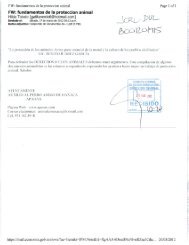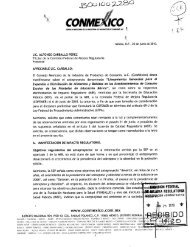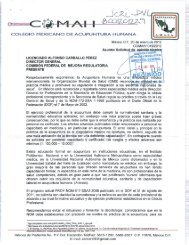Untitled
Untitled
Untitled
Create successful ePaper yourself
Turn your PDF publications into a flip-book with our unique Google optimized e-Paper software.
weight loss was greater after 6 months with a low-fat highcarbohydrate<br />
diet as compared with a higher fat control diet<br />
(Saris et al., 2000). There are several possible explanations for<br />
this difference in results. First, in the trials with dietary<br />
advice, protein intake was substantially higher for the lowcarbohydrate<br />
relative to the low-fat diet, whereas the<br />
opposite was true for the CARMEN trial. The promising<br />
hypothesis that a higher protein content of the diet may<br />
contribute to weight management requires further research.<br />
Second, the nature of the foods included in the low-fat diet<br />
may have differed: in the CARMEN trial the low-fat diet<br />
included many reduced-calorie versions of otherwise similar<br />
full-fat foods, whereas diverse self-chosen high-carbohydrate<br />
foods may have been included in the low-fat diets in the<br />
trials with dietary advice. Third, the characteristics of the<br />
interventions unrelated to physiological effects of macronutrient<br />
composition may have played an important role. In<br />
the trials with dietary advice, the low-carbohydrate diet was<br />
probably the most novel, simple and restrictive diet, whereas<br />
in the CARMEN trial the lower carbohydrate diet was a<br />
control diet that required little change in food choice.<br />
Long-term dietary and lifestyle interventions (X2 years)<br />
show that consumption of a relatively high-carbohydrate<br />
diet (B55% of energy) that includes high amounts of fiberrich<br />
foods can be compatible with clinically relevant weight<br />
loss (Tuomilehto et al., 2001; Knowler et al., 2002; Esposito<br />
et al., 2004; Mayer-Davis et al., 2004). A Mediterranean-style<br />
moderate-fat diet with a lower carbohydrate content (B50% of<br />
energy) was also associated with substantial weight loss after<br />
18 months (McManus et al., 2001). Taken together, the<br />
available data do not provide strong evidence that either<br />
increasing or decreasing the energy percentage of carbohydrate<br />
in the diet by itself has an important effect on body weight.<br />
Free sugars<br />
Introduction<br />
Free sugars are defined as added sugars plus concentrated<br />
sugars in honey, syrups and fruit juices. Because glucose chains<br />
in starches can be rapidly broken down in the gastrointestinal<br />
tract, many starchy foods induce a more rapid increase of<br />
blood glucose concentrations than many foods high in free<br />
sugars (Foster-Powell et al., 2002). However, other characteristics<br />
of free sugars can be relevant for energy balance. Foods<br />
high in free sugars have been proposed to contribute to weight<br />
gain as compared with starchy foods because of lack of dietary<br />
fiber and high energy density (Poppitt and Prentice, 1996),<br />
higher palatability because they are sweeter (Raben et al.,<br />
1997), unique effects of fructose (Elliott et al., 2002) and<br />
because these are often consumed in the form of high-caloric<br />
liquids instead of solid foods (Mattes, 1996).<br />
Micronutrient dilution<br />
‘Micronutrient dilution’ refers to a reduction of the micronutrient<br />
content of the diet as a result of the displacement of<br />
Carbohydrate intake and obesity<br />
RM van Dam and JC Seidell<br />
micronutrient-rich foods by foods high in free sugars. Studies<br />
in children, adolescents and adults have reported that a high<br />
energy percentage of the diet as free sugars is associated with<br />
lower intakes of various micronutrients (Alexy et al., 2003;<br />
Charlton et al., 2005; Kranz et al., 2005). In addition, a high<br />
free-sugar content of the diet has been associated with lower<br />
intakes of fiber (Kranz et al., 2005) and fruit and vegetables<br />
(Charlton et al., 2005). Regular consumption of foods high in<br />
free sugars does not have to be associated with micronutrient<br />
deficiencies (Ruxton, 2003). However, given that the energy<br />
intake that is compatible with avoiding weight gain in<br />
modern societies with little occupational physical activity is<br />
limited, it should be considered that a high intake of energy<br />
as free sugars will generally make it more difficult to achieve<br />
optimal intakes of micronutrients, phytochemicals, fiber and<br />
fruit and vegetables.<br />
Postprandial insulin secretion and body weight<br />
The effect of postprandial insulin secretion on energy<br />
balance is controversial. On the one hand, it has been<br />
postulated that a high postprandial insulin response may<br />
lead to weight gain through various mechanisms. First, a<br />
high postprandial insulin response may rapidly lower blood<br />
glucose and free fatty acid concentrations, which might in<br />
turn induce the secretion of counter-regulatory hormones.<br />
These hormones may stimulate hunger and energy intake<br />
and may also lower resting energy expenditure through a<br />
proteolytic effect that reduces lean body mass over time<br />
(Ludwig, 2002; McMillan-Price and Brand-Miller, 2006).<br />
Second, it has been suggested that high postprandial insulin<br />
responses may reduce fat oxidation and increase fat synthesis<br />
and storage (McMillan-Price and Brand-Miller, 2006). However,<br />
hyperinsulinemia has been associated with reduced<br />
weight gain in several longitudinal studies (Valdez et al.,<br />
1994; Hoag et al., 1995; Schwartz et al., 1995), and the<br />
quantitative significance of the effect of higher insulin levels<br />
on de novo fatty acid synthesis in adipose tissue in humans<br />
has been questioned (Wolever, 2006).<br />
On the other hand, it has been postulated that low<br />
postprandial insulin responses may lead to reduced satiety<br />
(Elliott et al., 2002). Lack of insulin response can lead to<br />
reduced leptin production by adipose tissue and both leptin<br />
and insulin can play a role in inducing satiety (de Graaf et al.,<br />
2004; Schwartz and Porte, 2005); however, in short-term<br />
experiments, the effect of insulin infusion on appetite and<br />
food intake has not been consistent (Wolever, 2006). Taken<br />
together, it has not been established whether variation in<br />
postprandial insulin responses has substantial effects on<br />
body weight regulation in humans.<br />
Fructose intake, satiety and body weight<br />
In contrast to glucose, fructose ingestion elicits little<br />
response in blood glucose and insulin concentrations. It<br />
has been suggested that high intake of fructose intake may<br />
S85<br />
European Journal of Clinical Nutrition
















